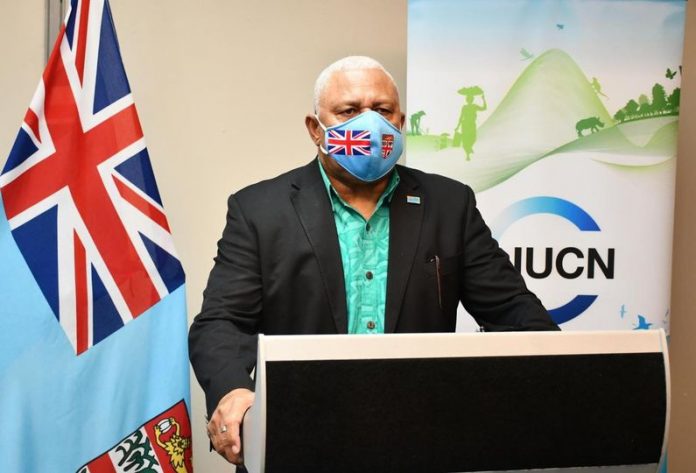“The relentless demands we humans have placed on the Earth are driving more than a million species of plants and animals to the brink of extinction. This climate-fueled loss in biodiversity will be irreversible. Once these species are gone, they are gone. There is no turning back the clock.”
These were the bold remarks by the Prime Minister, Voreqe Bainimarama while delivering the opening address in a video recorded message at the IUCN World Conservation Congress High-Level Strategic discussion in Marseille, France.
With the theme “Influence of Biodiversity Loss and Climate Change on Public Health,” the Prime Minister stated that human health is not immune to global temperature rise and that both the health of individuals and the general health of the community are tied intimately to the health of the planet. Some of these effects according to Prime Minister Bainimarama are immediate and impactful, such as the damage violent storms cause to health care facilities which often render them unable to function at the very time they are most needed.
PM Bainimarama further stated that in Small Island Developing States (SIDS), health care facilities are often in low-lying areas that are subject to flooding and storm surges, which makes them particularly vulnerable.
Using Fiji as an example, PM Bainimarama shared with the high-level participants the damages caused by Tropical Cyclone Winston in 2016. These damages included 88 of 214 national health centres in Fiji – seven of them beyond repair at a time when 125 Fijians were injured and 44 died while thousands were without shelter, food, safe water, and infectious diseases breaking out in many areas.
Additionally for SIDS, Prime Minister Bainimarama said there is an increase in hospital admissions and treatments from some of the same conditions and infectious diseases that surged in the wake of Tropical Cyclone Winston. Responding to this, the Ministry of Health and Medical Services of Fiji has been working to increase its capacity to monitor, assess and respond to climate-sensitive diseases in order to reduce health risks associated with climate change.
“But it’s not only storms we’re worried about. We cannot overlook the matter of biodiversity. Studies have confirmed that many public health diseases are linked to the loss of biodiversity, which is due at least in large part to climate change. For example, the Ebola virus outbreak in West Africa from 2014 to 2016 stems from environmental degradation—particularly deforestation, which forced bats, which were the vector of the disease, out of their natural habitats.”
The Prime Minister reiterated the need for the world to recognise and embrace the fact that biological diversity is a global asset of tremendous value to the present and future generations. Further elaborating on this, the Prime Minister said that biodiversity keeps the earth in balance and prevents species that carry disease or can destroy crops from spreading to new areas or becoming dominant and unstoppable.
“In Fiji, we are taking a transformative approach by attacking the root of the problem. We are restoring and reversing biodiversity loss. We are planting 30 million trees and restoring and expanding mangroves, for example. And we are watching carefully for declines in species.”
Prime Minister Bainimarama added that Fiji is also strengthening the enforcement of environmental legislation, investing in ecosystem conservation and community-based management of natural resources. These will work with biodiversity restoration programs to minimize or halt further degradation of biodiversity–all while sustaining livelihoods. Fiji is committed to the 100 percent sustainable manage of our ocean with 30 percent declared as marine protected areas.
“The processes and actions that link ecosystems and species, including us humans, are complex. Damage in one part of the world may have unforeseen consequences elsewhere, often far away and several years or even generations later. But that linkage works in our favor as well, because positive actions in one part of the world can have a dramatic positive effect thousands of kilometers away.”
The Prime Minister concluded his address affirming the need for a holistic, ecosystem-based strategy that would be consistent globally – integrating the management of land, water and air.
Stating there is no time to lose, the Head of Government then called on the global community to support nature-based solutions to addressing climate change and halting biodiversity loss, identify and implement ecosystem-based adaptation and mitigation measures which help reduce the risk of species extinctions and prevent further damage to ecosystems. Lastly, to innovate and maintain green coastal-protection structures that are cost-efficient and effective compared to the conventional engineering solutions that the world has turned to thus far.
SOURCE: FIJI GOVT/PACNEWS














